My wife Meg and I were married on November 16th, 2013: one and a half years ago at this point. Our wedding was a fascinating and completely consuming process and occasioned many “deep thoughts.” I have attempted to capture some of them here.
Basic attitude: what’s actually happening here?
A wedding is a transaction between a community and a couple. The couple is legitimized, and promised aid, and the couple, in turn, swear a most excellent oath that they truly do love, and will love one another, and help one another to grow in the best possible way.
Much wedding advice emphasizes an egotistic point of view: “it’s my / our special day.” But, really a wedding is a community building event. You’re telling a story to your community about itself and your role within it. So, focus on your mate and your wedding guests: with such potent and wonderful raw ingredients as a wedding is made of, you cannot fail.
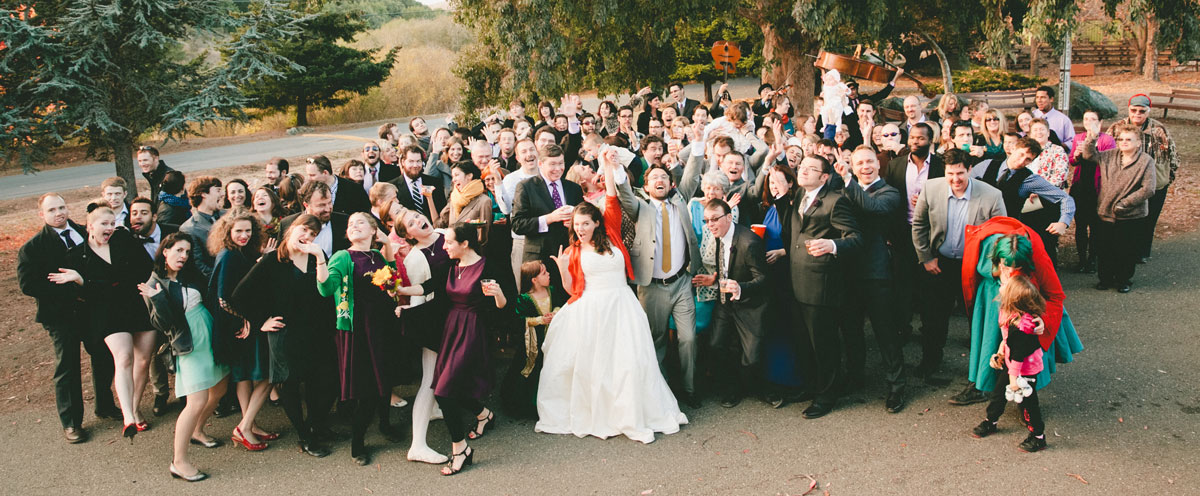
After all, as Cole Porter said: it’s “nice work if you can get it.” So relax, and savor. You will never again have the people you love most in the world collected together for this reason.
As with any creative act, be in awe of your ingredients, and put them together simply, with good timing. You are working with potent stuff!
During the wedding, I found my thoughts often returning to Joseph Campbell, the mythologist, and his ideas about the function of ceremonies to guide individuals through the stages of life. A wedding marks one of the major transitions in life, from childhood, to maturity, and so it’s a “once in a lifetime” moment. Life stretches from this moment, towards death. Either biologically or culturally the couple will be a creative force in the world. All this inevitably pushes the mind towards meaningful thoughts of life and death, which is the source of the great power of weddings.
Objectively, you’re just normal folks doing something fairly routine. But on another level, you are enacting an archetypical ceremony which has been honed and refined over thousands of years. The potential is there for you to experience a peak of subjective experience which will subtly work to transition you to a new life phase.
Grooms’ broken “cultural script”
I read many books, my favorite of which was A Practical Wedding, and did a lot of research online. It was so hard to find any good, meaningful content for men who are getting married! Grooms are supposed to be man-children who allow their “crazy fiancee” to make all the decisions. The only important event to grooms is supposedly the bachelor party, in which he will say a debaucherous farewell to his “freedom.”
I found these ideas and attitudes deeply unhelpful. I feel bad for all grooms. With such cultural baggage, it takes an unusually thoughtful and secure groom to avoid being tripped up.
Perhaps I am a creation of my times. Some of the better articles I read referenced shifting cultural habits: nowadays, more weddings are paid for by both the bride and groom. I paid for half of the wedding, why shouldn’t I make sure I’m paying for something that is meaningful and fun for me as well as my future wife?
Imagine, instead of a wedding, you were planning a huge, no-expenses party for the most important people in your life. What is more, you get to introduce different groups of people (your college friends, your wife’s friends, your old roommates in the city, your family, your wife’s family) to one another. It’s a reunion of all your loved ones and a celebration of your lives up to that point. You enjoy parties, right? Would you want to be totally disconnected, marginalized, and kicked out of the planning of the biggest party ever? Of course not! Don’t you care about who will be invited, where it will be, what you will be doing? The music that will played at the dance party? The food that you will eat? The alcohol that you will drink?
I suggest chucking the cultural script in the garbage bin and taking an active role in planning the wedding. You, your wife, your family, and all involved will enjoy the day much more if you’re a fundamental part of it.
Because of my active role in the planning of our wedding, I picked up knowledge I thought other couples currently planning weddings might find useful. Below are some tips, from a male perspective, on planning an affordable, meaningful, and wonderful wedding.
Practicalities
The importance of focusing—and punting on the other things
Too many people try to “do it all” … a wedding planner friend told me stories of $1000 bags of rose petals and such … pick just a few “special things” and focus your efforts on those. Punt or make the minimum necessary effort on the others. You only need a few truly memorable things to make your wedding a great success.
We focused on:
- choosing a most excellent venue: it was at a summer camp, and once they arrived, no one had to drive anywhere
- performances of music and theater: a live band, the Talent Show
- the photo boards (this was Kevin’s big project)
We punted on:
- the food (we gave slight guidance and then delegated to the chef completely)
- the music (outside of the live band, we had a Spotify playlist)
- the place cards (we just bought a set of cardboard numbers for $15 and printed an Excel spreadsheet of seat assignments)
If things go wrong
You’re not doing it all yourself. People bring their best selves to a wedding—if anything goes wrong, you will have help. I remember when we wanted to go to “The Boogie Barn” for our late night dance party, we hadn’t figured out how to carry over the keg from the dining hall. In actuality, there was a team of 5 burly guys who carried it wherever we went. When loading or unloading things, we had more helpers than we knew what to do with.
With so many people around, you’ll be hard-pressed for anything to truly fall through the cracks. And if it does, not many people will notice or care. If, in the end, you are married, and had food and drinks and dancing, then everything pretty much went as it should.
Remember that people want to feel a part of the wedding, so accept their offers to help. This leads me to…
Roles for community members
This is why the traditional wedding has roles for the community: the wedding party, the Best Man’s speech, the Maid of Honor’s speech …
Embrace this: assign roles to your community members. This makes the event feel organic and creates a feeling of participation, ownership and pride in your group. You most definitely want this. If you have more community members than you have roles, create more roles: for example, the girls in our friend group have the tradition of crafting decorations for the reception.
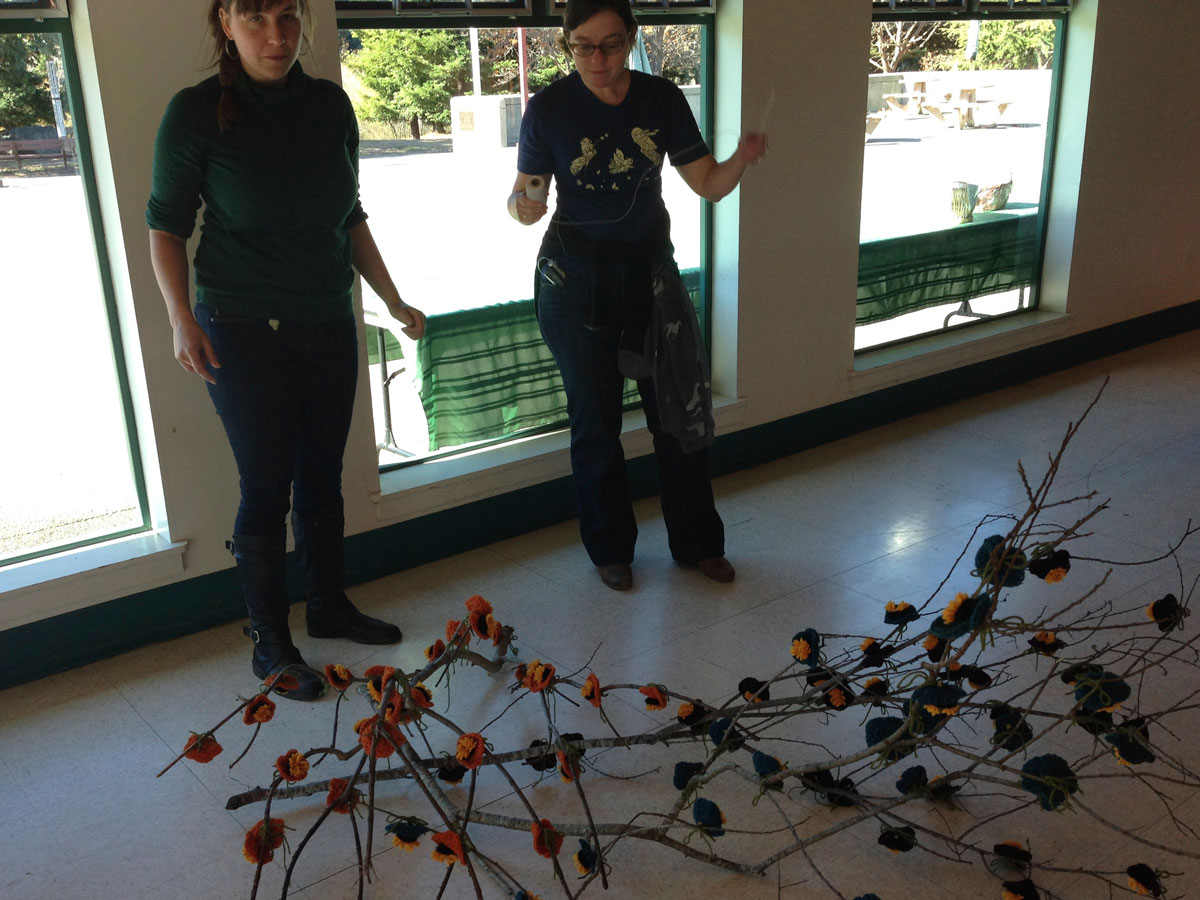
On the Friday before the wedding we created a “Talent Show” … but in a big way. We asked our friends and families to perform for each other and 7 groups agreed … there was a Trapeze Act, an Improv Comedy show, my parents, aunts and uncles sang traditional church music, one friend wrote the most amazing “Gangsta Rap” with biographical lyrics … I created a playful “program” … Another friend mixed the drinks for us. Another friend carried the train of Meg’s wedding dress. We asked our best old friend to be the officiant and she wrote an incredible speech for us.
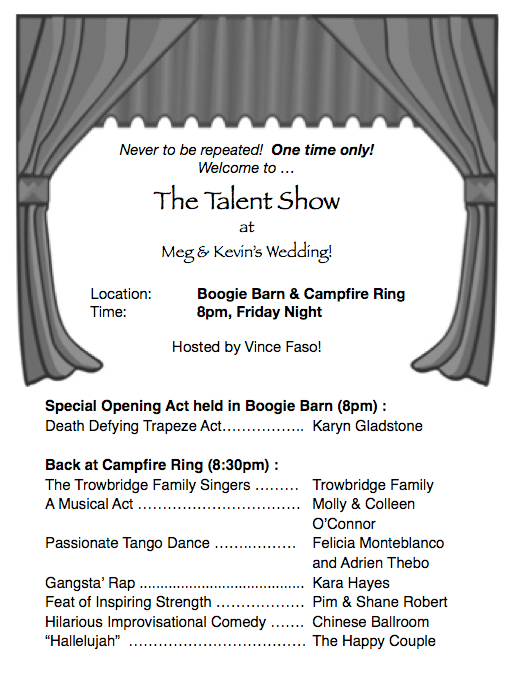
Choosing a venue (more space and time is better)
Each hour is precious. Your goal is to enable more “quality time” and reduce time spent figuring out banal logistics. The guests will not self-organize very much just out of shyness, uncertainty, inertia, and other things to do.
When we have traveled for weddings I’ve generally been dismayed by how much time was consumed by meaningless shuffling around and confusion. In New York City, for example, people stayed in different areas of the city: 10-20 blocks looks small on a map but, in the morning when you consider: “Where to get coffee?” 20 blocks is barrier that blocks coordinated activity. Also, the huge city has a pull of its own, away from the focus of your wedding.
We preferred a rural location for our wedding: we rented a summer camp. Once the guests arrived on Friday night, they could park their cars, and not drive again until Sunday afternoon. Most everyone slept, and all meals were served onsite. We were extremely happy with this decision. It was a fundamental choice which made everything easier, cheaper, and created space and time to allow wedding energy to be focused.
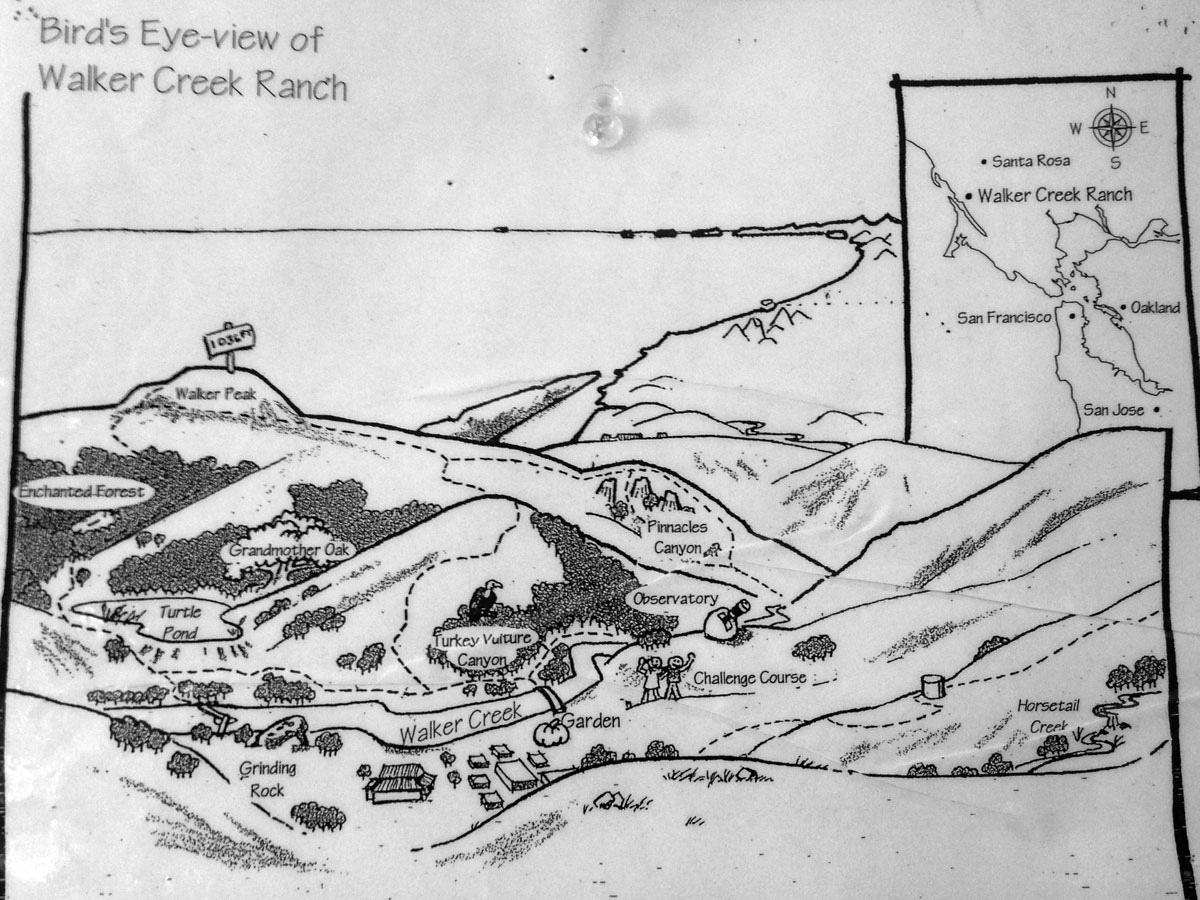
Of course the summer camp idea isn’t for everyone. But, I think some of the ideas could be adapted to any wedding: creating some geographic location to focus on, perhaps by getting the cooperation of a restaurant to be the “community bar” for the weekend.
Consider the problem of what to do the night before the wedding: often the wedding party will do their “rehearsal dinner” and leave everyone else in dark. If simple plans were laid just: “Billy’s Pizzeria is the official restaurant for the wedding and everyone should meet up there on Friday night,” then the wedding party can join the other party as soon as they are done with their rehearsal, and you’ve created a fantastic night. The anticipation of the two groups joining will create a good emotional arc.
Good news—spending more can make the feeling worse
“After all, what really matters on your wedding day, what you’ll remember ‘til you’re old and gray, is not so much how it looked as how it felt.” –“A Practical Wedding” Meg Keene
Meg and I both loved this quote and it summed up my experience of attending weddings. The audience is supremely intelligent and cannot be fooled by mere expense and opulence. In fact, this can be off-putting as a sign of “something to prove” and, the distastefulness of waste. Our favorite wedding of all time was done quite inexpensively, but with great attention, inventiveness, and love. In general, what I’m trying to say is that relationship between price and quality in weddings is very slim.
The logistical spreadsheet
Another tip from “A Practical Wedding,” was to create a “Day-Of” spreadsheet. To quote Meg Keene:
When you are finally down to the wire, wedding planning has nothing to do with style, and everything to do with hauling … This document will be the one you hand over to your helpers, what makes the day flow smoothly, and the one that allows you to fully let go, and absorb the experience of getting married, knowing there is a good plan, in competent hands.
I carried this with me the whole weekend, and it kept us sane. The process of creating the spreadsheet helped us to imagine and fully think through everything. Additionally, I could hand over this spreadsheet to any reasonably competent friend and trust that they could muddle through: in this way they would know our intentions (what is this box of random crap for?) and who else would be involved.
You can see our full Google Spreadsheet here.
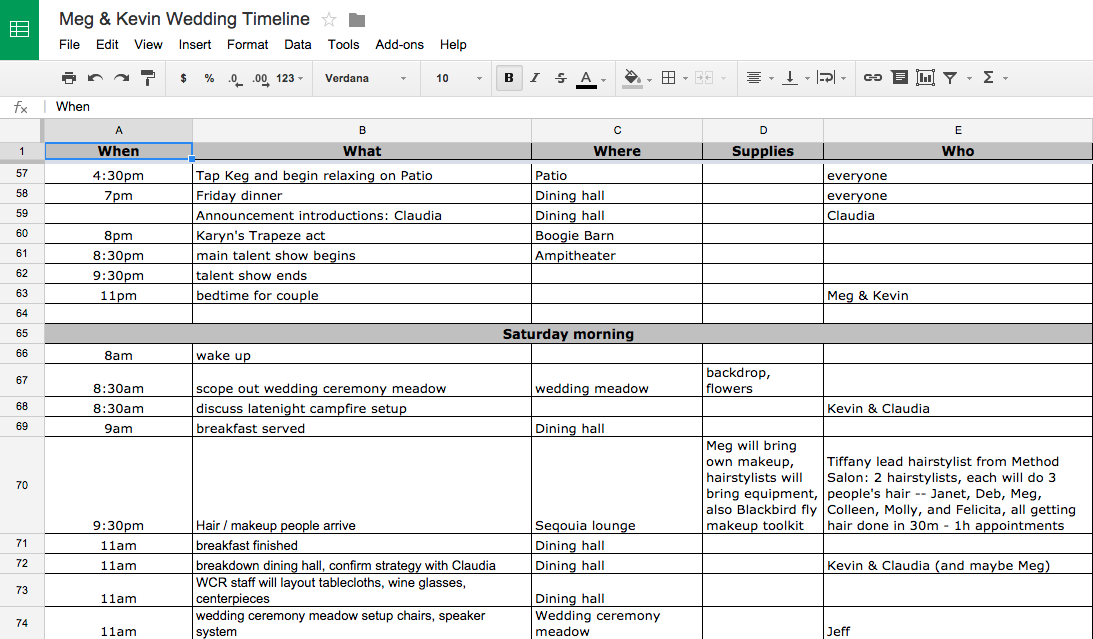
“Who are all these people?”: Photoboards
There’s a good chance that most of the people you invite will have no idea who anybody else is. The time flies by, and attendees will be lucky to gain a basic understanding of your family. The traditional structure recognizes this and features your families and the wedding party, on purpose: so that the audience will take note of them and realize they are important in your life. But if you grasp the “educational” nature of a wedding, you can come up with other means of explaining just who everyone is.
My way of doing this was to create a series of photoboards. I organized them thematically: “Our Folks”, “Childhood”, “College / Travels”, “We Left our Hearts in San Francisco”, and “Meg & Kevin.”
After a number of false starts, I figured out the cheapest way: I bought five “foam core” boards and covered them in fabric. I sorted and selected the the pictures digitally (a huge undertaking, looking through thousands of photos …). I was able to print these out on a color printer at our local print shop (I think it cost something like $0.49 per page). Then, I cut them out of the 8.5x11” sheets using the paper cutter at the print shop. Finally I pinned the photos to the foam core using thumbtacks.
The photo boards were a great success! Late on the first evening, we saw some of our friends in the dark dining hall (the lights were off), using their phones as flashlights to look through the photos, and chuckling and sighing. Pictures are inherently fascinating to people. Even babies and toddlers understand pictures.
These pictures helped the wedding attendees understand who they all were, in relation to themselves. It helped to contextualize our lives, our families, our past, and the great value and meaning of this event for us.
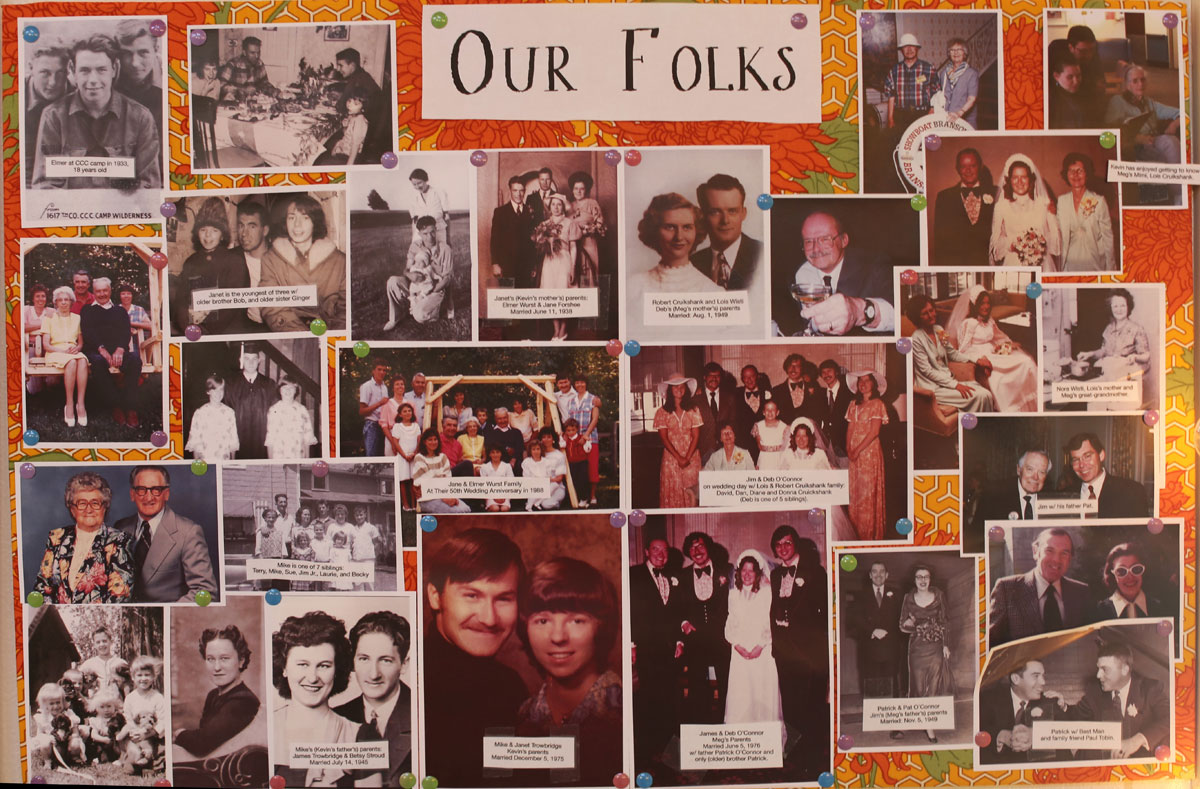
Digital vs traditional invitations – and timing of digital invitations
Weddings are an occasion when tradition takes over, and stipulates certain behaviors. So, they evolve more slowly than normal life. This is especially evident when you consider how the invitations and communications happen.
Nowadays, most people organize themselves digitally. We send text messages or emails or Facebook messages to choose a time & place, and then we send reminders immediately beforehand. You don’t need to bring any physical documents with you in order to locate where you’re supposed to be, because you can always just look it up on your phone, or send a text message to confirm.
Weddings break this, because people send paper invitations, and often skip electronic communications. I think this is a risky way to follow tradition - in our case, we nearly missed a friend’s ceremony because we foolishly left the paper invitation at home and misunderstood the proximity of the wedding location. This caused us to drive recklessly down the highway, miss our exit, miraculous pull a U-turn through the highway median, and arrive just as the bridesmaids were lining up to walk down the aisle.
When Meg and I were married, we created a beautiful “Save the Date” email, months in advance. For the family members who did not have email access, we printed out our email and mailed it to them. After the “Save the Date,” we sent several more emails to remind folks about setting up accommodations, activities to do while in the Bay Area, and keeping the line of communication open for any questions people had leading up to the wedding. The only piece of physical mail we sent to everyone, was the physical invitation bundle w/RSVP cards. We found this mixture of digital communications and the physical RSVP cards provided great way to double-check our lists.
Most importantly, 2 days before the wedding, I sent one final email to everyone that contained the address of our wedding venue, so that as people were traveling, they would have all the information they needed at hand on their phones.
Videography: the uncharted territory of wedding photography
Professional wedding photographers are very good at one thing: lining everyone up and taking traditional wedding pictures. An amateur photographer might not have the crowd control abilities to carve out the space for pictures. And, those slightly staged pictures are invaluable. They are some of the best, highest quality pictures taken of folks in the prime of their lives. Just look at your grandparents’ wedding pictures, if you are lucky enough to have them. They’re treasures.
But, a few things: Our friend Ian, who is a great photographer, took ~600 pictures. Since Ian knows, and is known by, our group of friends, he was able to evoke very authentic, characteristic expressions and situations. In many ways, I much prefer Ian’s photos (which were free) to the $2500 professional photos.
Another thing is, we punted on the idea of a videographer. Professional photographers don’t tend to take video, I think it’s either a different skill, hard to sell, or people don’t realize they want this.
However, if a picture is worth 1,000 words, a video must be worth a million. You want a video of your wedding ceremony, and of the special events during the reception. When I look at our wedding photos, I smile and they’re cute. When I watch the video of our ceremony, and of the special events during the reception. When I look at our wedding photos, I smile and they’re cute. When I watch the video of our ceremony, I am transported back to that moment. It is invaluable.
So, I think that wedding photographers should offer videography. In the absence of this, ask one of your mindful friends to take a video with their iPhone. Even a shaky video is infinitely better than none at all. If you’re at a wedding, look around, and if no one else is recording the ceremony, pull out your iPhone and grab a recording of it. The bride and groom will be so thankful to you later.
